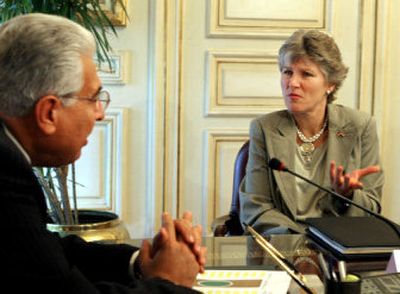U.S. official talks to Saudi women about their rights

JIDDAH, Saudi Arabia – Undersecretary of State Karen Hughes questioned Tuesday the Saudi ban on driving by women, telling a crowd of several hundred Saudi women, covered head to toe in black clothing, that it had negatively shaped the image of Saudi society in the United States.
“We in America take our freedoms very seriously,” Hughes said. “I believe women should be free and equal participants in society. I feel that as an American woman that my ability to drive is an important part of my freedom.”
Women in the audience applauded after she also mentioned that they should have a greater voice in the Saudi political system, including eventually receiving the right to vote.
Hughes hastened to add that Saudi society must change at its own pace and according to its own traditions, but she went significantly further in her statement than Secretary of State Condoleezza Rice did on a visit three months ago. Rice pressed for greater political freedoms for women but dismissed the subject of driving as “just a line that I have not wanted to cross.”
Asked about the contrast between her comments and Rice’s, Hughes said her remarks were part of a U.S. policy of “slowly advancing ideas” with the Saudis. “My job is to raise issues in, I hope, a respectful way, to help other countries understand concerns Americans have,” she said.
Newly appointed to run public diplomacy efforts for the Bush administration, Hughes was on a weeklong tour of the Middle East to improve the image of the United States, but the tables were turned Tuesday in meetings with Saudi students, journalists and officials.
During a meeting with top Saudi editors, Hughes pointedly noted that the United States was concerned that inflammatory literature intolerant of other religions and traced to the Saudi government had been found in American mosques.
Hughes added that Americans were upset that Muslim clerics did not immediately condemn the Sept. 11, 2001, attacks in the United States. She urged Saudis “to speak out and be very vocal” when “you have someone committing these acts in the name of your faith.”
Freedom House, which monitors civil and political rights around the world, reported this year that it had collected from more than a dozen mosques in the United States about 200 original documents that condemn democracy as anti-Islamic and assert that Muslims are religiously required to hate Christians and Jews.